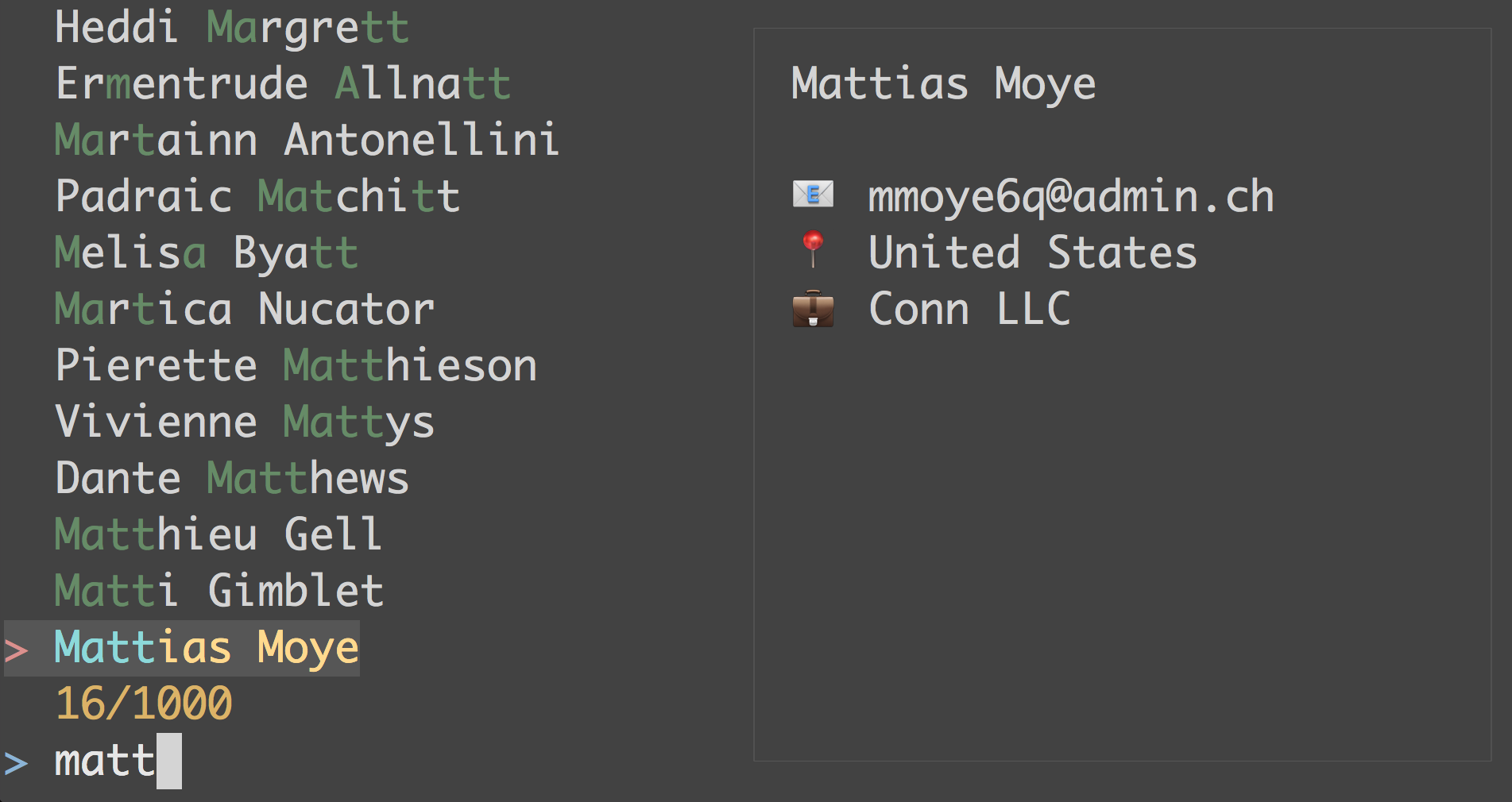 Documentation
¶
Documentation
¶
Overview ¶
Package fuzzyfinder provides terminal user interfaces for fuzzy-finding.
Note that, all functions are not goroutine-safe.
Index ¶
Examples ¶
Constants ¶
const ( // ModeSmart enables a smart matching. It is the default matching mode. // At the beginning, matching mode is ModeCaseInsensitive, but it switches // over to ModeCaseSensitive if an upper case character is inputted. ModeSmart mode = iota // ModeCaseSensitive enables a case-sensitive matching. ModeCaseSensitive // ModeCaseInsensitive enables a case-insensitive matching. ModeCaseInsensitive )
Variables ¶
var ( // ErrAbort is returned from Find* functions if there are no selections. ErrAbort = errors.New("abort") )
Functions ¶
func Find ¶
Find displays a UI that provides fuzzy finding against to the passed slice. The argument slice must be a slice type. If it is not a slice, Find returns an error. itemFunc is called by the length of slice. previewFunc is called when the cursor which points the current selected item is changed. If itemFunc is nil, Find returns an error.
itemFunc receives an argument i. It is the index of the item currently selected.
Find returns ErrAbort if a call of Find is finished with no selection.
Example ¶
package main
import (
"fmt"
fuzzyfinder "github.com/umaumax/go-fuzzyfinder"
)
func main() {
slice := []struct {
id string
name string
}{
{"id1", "foo"},
{"id2", "bar"},
{"id3", "baz"},
}
idx, _ := fuzzyfinder.Find(slice, func(i int) string {
return fmt.Sprintf("[%s] %s", slice[i].id, slice[i].name)
})
fmt.Println(slice[idx]) // The selected item.
}
Example (PreviewWindow) ¶
package main
import (
"fmt"
fuzzyfinder "github.com/umaumax/go-fuzzyfinder"
)
func main() {
slice := []struct {
id string
name string
}{
{"id1", "foo"},
{"id2", "bar"},
{"id3", "baz"},
}
fuzzyfinder.Find(
slice,
func(i int) string {
return fmt.Sprintf("[%s] %s", slice[i].id, slice[i].name)
},
fuzzyfinder.WithPreviewWindow(func(i, width, _ int) string {
if i == -1 {
return "no results"
}
s := fmt.Sprintf("%s is selected", slice[i].name)
// As an example of using width, if the window width is less than
// the length of s, we returns the name directly.
if width < len([]rune(s)) {
return slice[i].name
}
return s
}))
}
func FindMulti ¶
FindMulti is nearly same as the Find. The only one difference point from Find is the user can select multiple items at once by tab key.
Example ¶
package main
import (
"fmt"
fuzzyfinder "github.com/umaumax/go-fuzzyfinder"
)
func main() {
slice := []struct {
id string
name string
}{
{"id1", "foo"},
{"id2", "bar"},
{"id3", "baz"},
}
idxs, _ := fuzzyfinder.FindMulti(slice, func(i int) string {
return fmt.Sprintf("[%s] %s", slice[i].id, slice[i].name)
})
for _, idx := range idxs {
fmt.Println(slice[idx])
}
}
Types ¶
type Option ¶
type Option func(*opt)
Option represents available fuzzy-finding options.
func WithMode ¶
func WithMode(m mode) Option
WithMode specifies a matching mode. The default mode is ModeSmart.
func WithPreviewWindow ¶
WithPreviewWindow enables to display a preview for the selected item. The argument f receives i, width and height. i is the same as Find's one. width and height are the size of the terminal so that you can use these to adjust a preview content. Note that width and height are calculated as a rune-based length.
If there is no selected item, previewFunc passes -1 to previewFunc.
If f is nil, the preview feature is disabled.
type TerminalMock ¶
type TerminalMock struct {
// contains filtered or unexported fields
}
TerminalMock is a mocked terminal for testing. Most users should use it by calling UseMockedTerminal.
Example ¶
package main
import (
"io/ioutil"
"github.com/gdamore/tcell/termbox"
fuzzyfinder "github.com/umaumax/go-fuzzyfinder"
)
func main() {
keys := func(str string) []termbox.Event {
s := []rune(str)
e := make([]termbox.Event, 0, len(s))
for _, r := range s {
e = append(e, termbox.Event{Type: termbox.EventKey, Ch: r})
}
return e
}
// Initialize a mocked terminal.
term := fuzzyfinder.UseMockedTerminal()
// Set the window size and events.
term.SetSize(60, 10)
term.SetEvents(append(
keys("foo"),
termbox.Event{Type: termbox.EventKey, Key: termbox.KeyEsc})...)
// Call fuzzyfinder.Find.
slice := []string{"foo", "bar", "baz"}
fuzzyfinder.Find(slice, func(i int) string { return slice[i] })
// Write out the execution result to a temp file.
// We can test it by the golden files testing pattern.
//
// See https://speakerdeck.com/mitchellh/advanced-testing-with-go?slide=19
res := term.GetResult()
ioutil.WriteFile("ui.out", []byte(res), 0644)
}
func UseMockedTerminal ¶
func UseMockedTerminal() *TerminalMock
UseMockedTerminal switches the terminal, which is used from this package to a mocked one.
func (*TerminalMock) GetResult ¶
func (m *TerminalMock) GetResult() string
GetResult returns a flushed string that is displayed to the actual terminal. It contains all escape sequences such that ANSI escape code.
func (*TerminalMock) SetEvents ¶
func (m *TerminalMock) SetEvents(e ...termbox.Event)
SetEvents sets all events, which are fetched by pollEvent. A user of this must set the EscKey event at the end.
func (*TerminalMock) SetSize ¶
func (m *TerminalMock) SetSize(w, h int)
SetSize changes the pseudo-size of the window. Note that SetSize resets added cells.
 Directories
¶
Directories
¶
| Path | Synopsis |
|---|---|
|
_example
|
|
|
cli
command
|
|
|
track
command
|
|
|
Package matching provides matching features that find appropriate strings by using a passed input string.
|
Package matching provides matching features that find appropriate strings by using a passed input string. |
|
Package scoring provides APIs that calculates similarity scores between two strings.
|
Package scoring provides APIs that calculates similarity scores between two strings. |
